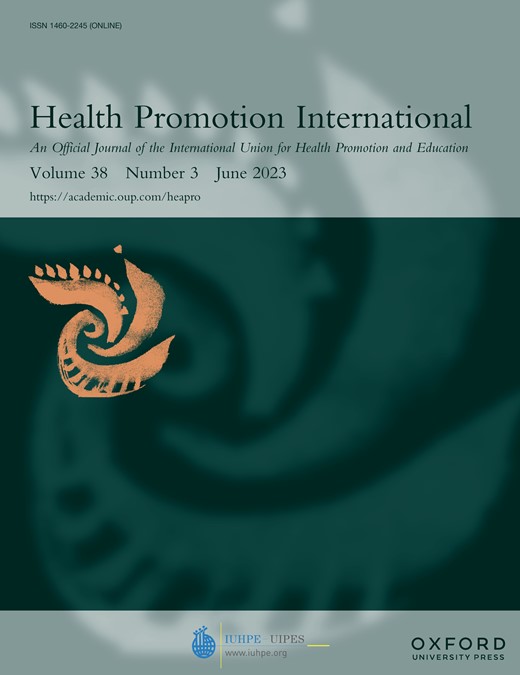-
Views
-
Cite
Cite
Hilde Grønningsæter, Charlotte Kiland, Theory-based implementation of physical activity programs in worksite health promotion settings: a systematic review, Health Promotion International, Volume 38, Issue 3, June 2023, daac048, https://doi.org/10.1093/heapro/daac048
Close - Share Icon Share
Summary
Worksites are important settings for implementing health promotion programs. Evidence for sustainable upscaling of physical activity (PA) programs and critical evaluation of the implementation process are scarce. In this article, we address the following research questions: (i) To what extent is the implementation process of PA programs theoretically informed? (ii) What characterizes the implementation process of PA programs in theory driven studies? (iii) Which facilitators and barriers are identified in the implementation process and at what level? We followed the Preferred Reporting Items for Systematic Reviews and Meta-Analysis guidelines. The databases Medline (Ovid) and Sportdiscuss (Ebsco) were searched for peer-reviewed original articles published in English (2000–2020), from a European, North American, New Zealand and Australian context. Reported implementation components and facilitators/barriers (F/Bs) were detected, interpreted and analyzed according to implementation theory. Appraisal of methodological quality on included studies was executed. Of 767 eligible studies, 17 studies were included, 11 of which conducted a theory-based process evaluation of the implementation. They implemented composite PA programs, at two or more levels with internal or mixed implementation teams. F/Bs were most frequently related to the implementation component ‘fidelity’, corresponding to organizational and implementer level, and the component ‘reach’ corresponding to program and participant level. Notably, only one study reported F/Bs on the socio-political level. Despite more frequent use in recent years of theory-based implementation, few studies reported implementation effectiveness. Major challenges regarding incoherent use of theoretical concepts and scarcity of empirically tested frameworks are discussed.
Lay Summary
Physical activity (PA) programs are popular health promotion initiatives in worksites. However, most PA programs are difficult to maintain and upscale, leading to misachievement of expected results. In this study, we address what drives or hampers the implementation of PA programs in a worksite health promotion setting. We specifically address how current theoretical frameworks add value to the implementation processes. The databases Medline (Ovid) and Sportdiscuss (Ebsco) were searched for peer-reviewed original articles. Reported implementation components and facilitators/barriers were detected, interpreted and analyzed according to implementation theory. Of 767 eligible studies, 17 studies were included for investigation. The World Health Organization has long called for more theory-based implementation of health promotion programs. Eleven studies explicitly invoked current theories in describing program implementation strategies. We find those implementing PA programs showing greater theoretical engagement compared to a sample from prior years, while nonetheless few recent studies reported overall implementation effectiveness. Implications for stakeholders of our results are discussed.



